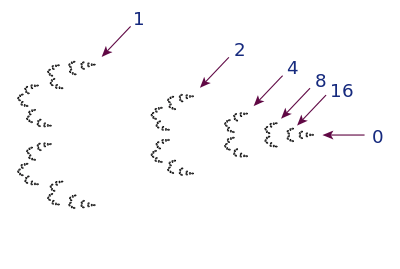''p''-adic order
In number theory, for a given prime number , the -adic order or -adic valuation of a non-zero integer is the highest exponent such that divides . The -adic valuation of is defined to be . It is commonly denoted . If is a rational number in lowest terms, so that and are relatively prime, then is equal to if divides , or if divides , or to if it divides neither. The most important application of the -adic order is in constructing the field of -adic numbers. It is also applied toward various more elementary topics, such as the distinction between singly and doubly even numbers.[1]

Definition and properties
Integers
Let be a prime in . The -adic order or -adic valuation for is defined as[2]
Rational numbers
The -adic order can be extended into the rational numbers. We can define[3]
Some properties are:
- Moreover, if , then
where is the infimum (i.e. the smaller of the two).
-adic absolute value
The -adic absolute value on is defined as
The -adic absolute value satisfies the following properties.
A metric space can be formed on the set with a (non-archimedean, translation invariant) metric defined by
The -adic absolute value is sometimes referred to as the "-adic norm", although it is not actually a norm because it does not satisfy the requirement of homogeneity.
See also
References
- ↑ David S. Dummit; Richard M. Foote (2003). Abstract Algebra (3rd ed.). Wiley. ISBN 0-471-43334-9.
- ↑ Ireland, K., Rosen, M. (2000). A Classical Introduction to Modern Number Theory. Springer-Verlag New York. Inc., p. 3
- ↑ Khrennikov, A., Nilsson, M. (2004). P-adic Deterministic and Random Dynamics., Kluwer Academic Publishers, p. 9